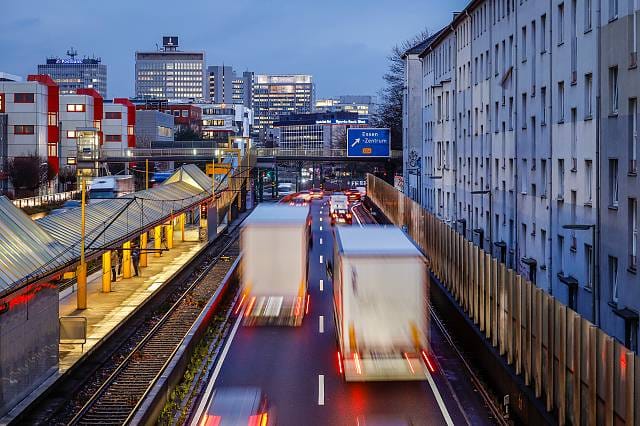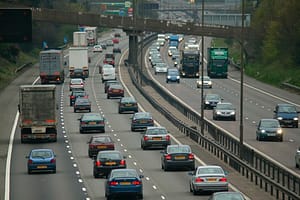If a truck driver’s behavior directly causes a crash, then naturally that individual would face clear-cut liability. Financial damages would be paid from the truck driver’s minimum required personal auto insurance policy as their employee liability coverage.
However, legal responsibilities cannot simply end there. Trucking companies also have rather extensive oversight duties under federal regulations—from vetting to training to supervising individual drivers. Breaching these obligations in any way equates to the company also shouldering blame when truck crashes occur, even if the company had no active, direct role in the accident sequence itself.
The technical legal term for this form of responsibility is called “vicarious liability.” In everyday language, vicarious liability implies that a company bears accountability for negligent actions and failings carried out by individuals under their control—in this case, drivers operating company vehicles.
The key factor creating this liability connection or chain is the company extending control and oversight via hiring a given driver or authorizing them to move company cargo using a company truck. These actions tie driver conduct directly to the company itself. When drivers cause crashes, the company should anticipate shouldering legal liability as well due to this intertwined responsibility created by the employment relationship.
Pinpointing company liability opens up far greater opportunities for robust financial recovery after an accident—which should be a top priority for victims and families desperately needing money to heal, recuperate and survive. While individual truck drivers merely have state minimum required personal auto liability coverage—typically just $50,000—trucking companies have $1 million or more in commercial trucking insurance coverage.
Tapping into those more sizable company insurance resources can fully and fairly compensate crash victims’ damages without leaving them vastly underpaid. Company liability laws exist exactly for this purpose—unlocking enhanced resources to make victims whole. However, finding a good lawyer, and then working with them, is often essential to successfully leveraging company negligence for enhanced payouts.
Everyday situations that establish clear company liability after accidents
While the baseline concept of vicarious liability generally links companies to driver conduct, several common real-world scenarios make legal liability even more unambiguous when truck crashes occur. Here are some of them.
The negligent driver was an official company employee
Companies naturally carry more scrutiny and oversight duties when the truck driver behind the wheel is an actual formal employee appearing on the company’s payroll, as opposed to an outside independent contractor. Official employee status means more policies, procedures, training programs and performance monitoring systems actively govern that driver’s conduct. Exercising direct supervision creates liability.
The driver was operating within official company job duties when the crash occurred
Alternatively, even if merely an independent contractor caused a crash, if that driver was actively fulfilling a route or hauling a load for the trucking company when the incident occurred, the contractor essentially adopts the company’s oversight duties and liability ties for the duration of that job. Carrying out company orders exposes companies to accountability.
The company failed to adequately train the driver on safety protocols
Trucking companies must properly train all drivers on federally mandated safe operational policies and defensive driving techniques. Should an accident result from clear driver negligence or error, the fact that the company did not adequately school them on safety expectations still reflects negligence on the part of the company.
The company hired an unqualified, reckless or negligent driver
Extensive federal regulations also require trucking companies to thoroughly vet driver applicants’ qualifications, driving records, licensing status, experience levels and past safety performance. Failure to sufficiently screen for high-risk drivers who are unable to operate safely suggests negligence by the company.
The company did not properly maintain equipment in roadworthy condition
Separate from driver oversight, trucking companies must also implement and follow rigorous inspection, maintenance and repair protocols to keep vehicles in sound roadworthy condition. Lacking service records or paper trails proving due diligence, or evidence of mechanical defects, could signal negligence by the company.
The company overloaded the truck beyond legal weight limits
Public safety also relies on trucking companies developing and enforcing appropriate freight loading procedures, including obeying federal weight limit rules. Carrying excess cargo weight impacts vehicle handling and substantially raises overall truck crash risk. Overloading suggests negligence.
In essence, a comprehensive approach to legal trucking company responsibilities encompasses drivers, trucks, operational policies, loading procedures and more. Falling short around vetting, supervising or equipping any of these facets lays the foundation for liability when subsequent crashes occur.
Violations demonstrating company negligence
In building a liability lawsuit against a trucking company, simply pointing to questionable conduct by individual drivers marks only a starting point. Attorneys must go further to solidify legal accountability. Fortunately, the trucking industry falls under rather extensive federal and state commercial transportation regulations. Violating these longstanding rules provides direct evidence of negligence by a company.
While some rules govern technical equipment specifications or freight classification procedures, several high-profile mandates speak directly to practices that impact public safety on roadways. Violating these regulations can help substantiate a company’s role in accidents. Here are some examples:
Breaking federal motor carrier safety administration rules
The FMCSA is the primary federal agency overseeing the US trucking industry. Their standards dictate critically important domains like driver training requirements, truck inspection procedures, vehicle maintenance schedules and allowable on-duty driver hours of service. Transgressing any FMCSA regulation demonstrates a trucking company’s negligence.
Failing to properly document driver activities
In a similar vein, companies must closely track all driver hours behind the wheel, rest periods, routes traveled and more via detailed records and logbooks. FMCSA regulations mandate compiling this data. When subsequent accidents occur, incomplete or falsified records undermine company attempts to evade liability.
Allowing unlicensed drivers to operate company trucks
Separate from carrier rules, all commercial truck drivers must hold a valid Commercial Driver’s License (CDL) certifying their qualifications to transport goods for hire. CDL credentials provide motor carriers and the public with ongoing visibility into individual driving records. Companies allowing unlicensed truck operations show negligence.
Violating mandatory drug and alcohol testing procedures for drivers
FMCSA regulations impose strict drug and alcohol screening protocols for commercial drivers. Failing to execute required testing enables unsafe drivers to take the wheel, increasing crash risk.
Violations are often an integral part of a case. Therefore, when uncovered, they can often be used to improve the chances of getting a fair compensation. For example, let’s say an accident happens in Midland. The best Midland truck accident lawyer can easily leverage documentation of violations like these to clearly demonstrate a trucking company’s role in an accident. This often works because judges and juries look very unfavorably upon companies flouting safety-focused regulations.
Contractors and vendors
Given the modern complexities of interstate commerce, large trucking companies rarely transport goods purely using their own drivers and company vehicles. Instead, carriers frequently outsource and subcontract key functions to external partners in order to focus on core transport operations:
Outsourced fleet maintenance and repair vendors
To ensure equipment remains roadworthy, carriers hire specialized third-party vendors to handle routine maintenance and mechanical repairs. If an accident results wholly or partially from truck malfunctions or equipment failure, liability can extend to maintenance contractors. Poor service or overlooked issues demonstrate shared negligence.
Third-party freight loading/unloading services
Similarly, to streamline warehouse activities, trucking firms utilize external loading/unloading contractors to directly handle cargo. If improper loading practices—resulting in uneven, dangerously unbalanced freight weight distribution across trailers or falling cargo—contribute to crashes, liability again reaches beyond the carrier alone.
Shared liability via contract fine print terms
The elaborate web of equipment leases, freight brokers, warehousing contracts and vendors governing trucking company supply chain networks obscures liability. As a result, attorneys must parse convoluted contract language dictating accident responsibility.
In this environment, legal liability can travel up the supply chain depending on the root causes of truck crashes. Therefore, lawyers must always meticulously assess the specific role of each distinct corporate entity touching a given shipment.
Conclusion
Holding a trucking company financially accountable for accidents hinges on grasping nuances surrounding vicarious liability, gathering evidence demonstrating negligence, and leveraging documentation of regulatory violations by drivers and management.
Building a convincing case demands extensive upfront effort from lawyers—crash reconstruction, witness interviews, vehicle inspections, driving logs review, policy manuals assessment and more. Yet the payoff for accident victims is access to the trucking company’s extensive insurance assets often necessary to fully cover total damages.
Without tenaciously pursuing trucking companies as defendants based on avoidable negligence or regulatory violations, injured victims and grieving families will likely only tap into minimal state-required liability coverage from individual drivers. That bare minimum level often leaves victims vastly under-compensated for lost wages, trauma, grief, and lifelong medical bills or disability care costs. Therefore, consulting an attorney immediately after an accident is usually advisable. This is because through aggressively yet strategically built legal cases centered on financial recovery, victims can work toward making themselves whole again after tragic, preventable truck crashes.





Leave a Comment